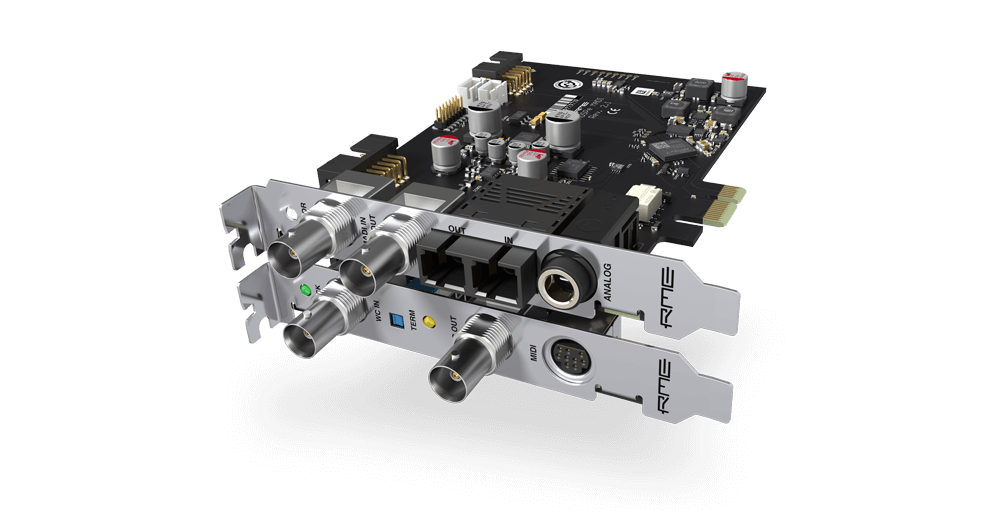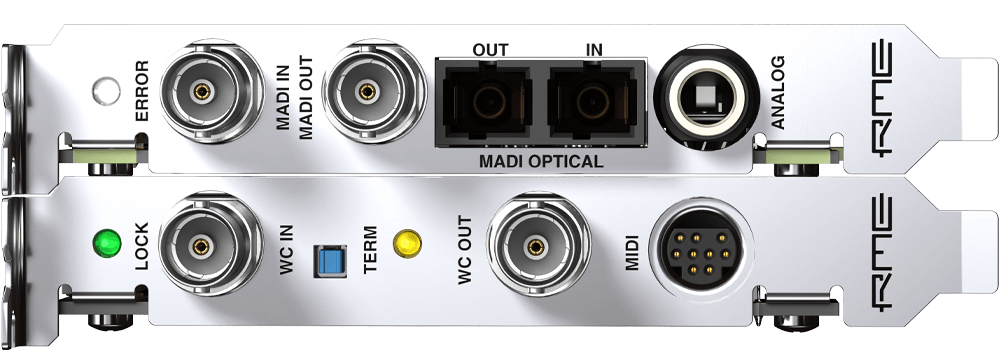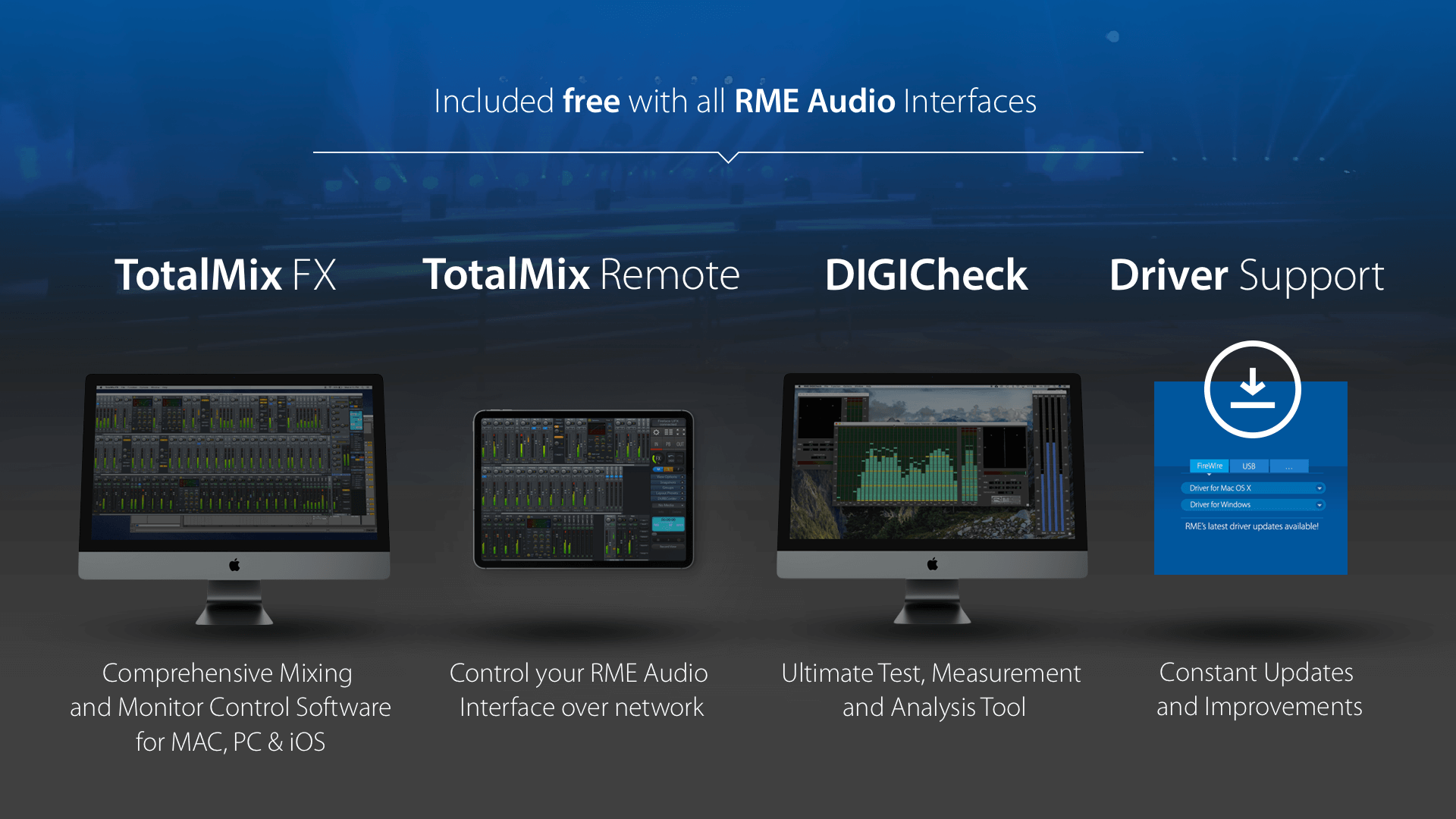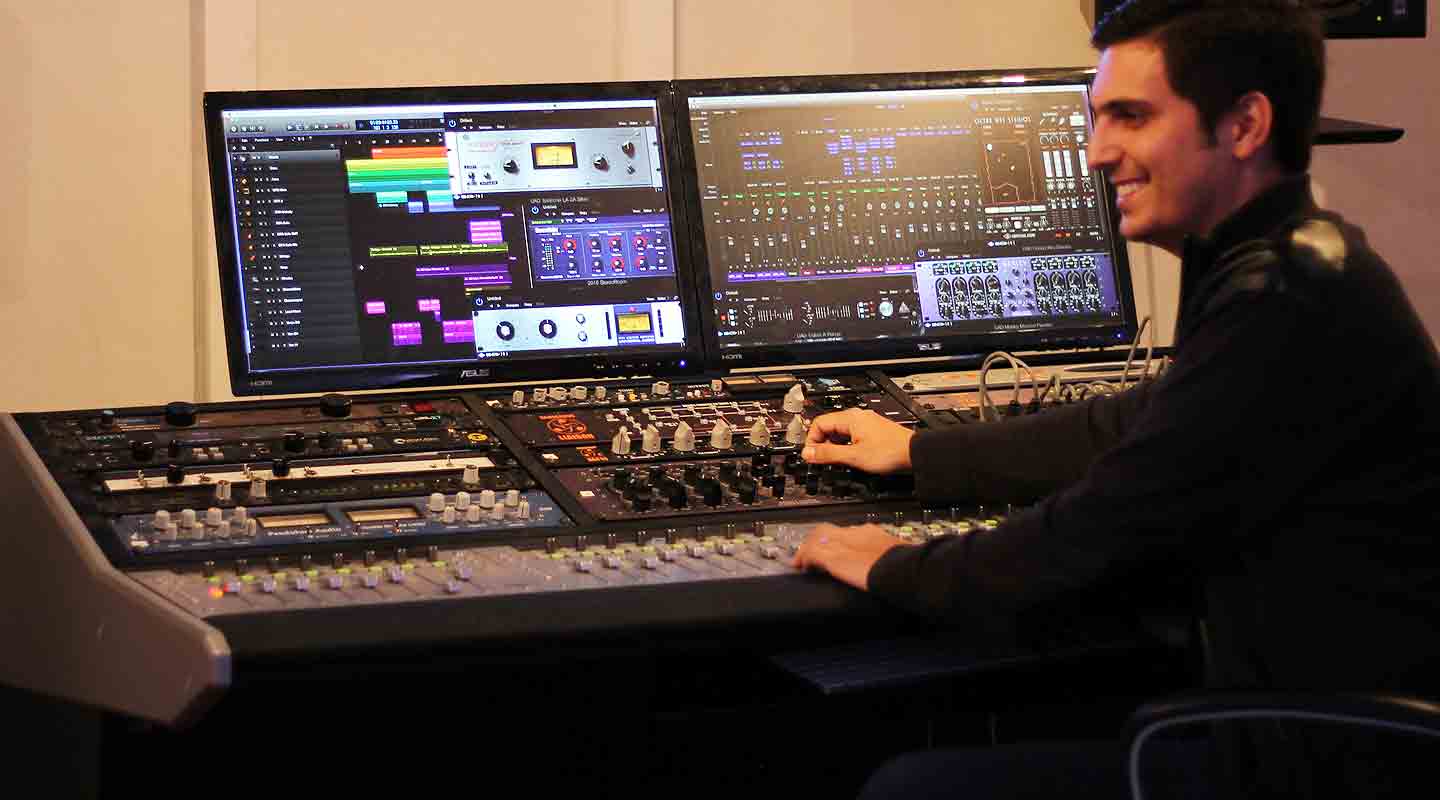HDSPe MADI
128-Kanal 192 kHz MADI PCI Express Card


Anschlüsse und Features
Die PCI Express-Karte nutzt konsequent alle Vorteile des MADI-Formats: Das Multichannel Audio Digital Interface der Profis bietet 64 Kanäle 24-Bit Audio bei bis zu 48 kHz Samplefrequenz, 32 Kanäle bei bis zu 96 kHz, und 16 Kanäle bei bis zu 192 kHz. Die Übertragung erfolgt dabei über eine einzige Leitung, entweder koaxial mit BNC-Steckern oder Lichtleiterkabel. In beiden Fällen können weit mehr als 100 Meter Kabellänge erzielt werden.
Verglichen mit der HDSP MADI (Standard-PCI) Variante bietet die PCI Express Version einige Vorteile: Die Unterstützung von höheren Sampleraten (bisher 96 kHz), mehr Optionen in TotalMix (Phase und internes Loopback pro Kanal, +6 dB Gain für die Ausgänge), sowie die Möglichkeit der direkten Anbindung der Time Code Option. Diese Vorzüge sind verbunden mit nochmals verbesserten Latenzen, welche die Karte nicht nur für Live-Recording Einsätze, sondern sogar für Live-Mixing Anwendungen interessant machen. Der analoge Monitorausgang nutzt die Low-Latency-Wandlertechnologie des ADI-8 QS, womit auch exzellente technische Daten (SNR/THD) garantiert sind.
Die HDSPe MADI ist vollständig kompatibel zu allen Geräten mit MADI-Interface. Sie lässt sich selbstverständlich ideal mit den Produkten der RME MADI-Serie kombinieren. So entsteht beispielsweise mit dem ADI-648 ein in Preis und Leistung unschlagbares 8-fach ADAT-Optical-Interface. Mit dem ADI-6432 steht der HDSP MADI ein bidirektionales AES/EBU-Frontend mit 64 Kanälen zur Verfügung.
Bei entsprechender Hardware des Rechners (PC/Mac) können drei HDSPe MADI gleichzeitig eingesetzt werden. Damit stehen 196 Eingänge und 192 Ausgänge auf einer einzigen Workstation gleichzeitig zur Verfügung!
Merkmale
Die Hammerfall DSP MADI bietet volle Unterstützung für 56- und 64-Kanal Modi, sowie Double und Single Wire (96k Frame) Technik für 96 kHz. Der volle 64-Kanal Support spiegelt sich auch im Hardware-Mischer TotalMix wider. Alle 64 Eingänge und 64 Playback-Kanäle lassen sich vollkommen frei auf alle 64 physikalischen Ausgänge routen und mischen. Das entspricht einem 8192-Kanal Mischer! Damit bietet die Hammerfall DSP MADI den bislang leistungsfähigsten, auf einer PCI-Express-Karte implementierten Router/Mischer, und erlaubt über den eigentlichen Rechner-I/O-Betrieb weitere interessante Anwendungen, wie:
- MADI optical Patchbay und Router
- MADI koaxial/optisch oder umgekehrt Wandler und Splitter
- MADI Redistributor, Patchbay und Router
TotalMix ist komplett per MIDI fernsteuerbar. Weiterhin stehen RMS- und Peak Level Meter in Hardware bereit, zur vollen Signalkontrolle von 192 Kanälen bei kaum messbarer CPU-Belastung.
Während die meisten MADI-Geräte eine zusätzliche Wordclock- oder AES-Leitung benötigen, kann HDSP MADI (wie auch der ADI-648) dank SteadyClock(TM) die Referenzclock jitterarm direkt aus dem MADI-Signal extrahieren, und so Verbindungen über lange Strecken noch einfacher machen. Wie von RME gewohnt bietet die Hammerfall DSP MADI weitere sinnvolle Ausstattungsmerkmale. Dazu zählt auch ein analoger, 24-Bit/192 kHz-fähiger Line/Kopfhörerausgang mit 116 dB Dynamik, so dass alle Ein- und Ausgangssignale direkt kontrolliert werden können.
Auf dem im Lieferumfang enthaltenen Expansion Board befinden sich der Wordclock I/O (BNC) und der MIDI I/O. Der Wordclock-Eingang ist mit einem Übertrager galvanisch getrennt, und verarbeitet Single-, Double oder Quad-Speed Signale vollautomatisch. MIDI I/O bietet per Breakout-Kabel 2 vollständige MIDI Ein- und Ausgänge (4 Buchsen DIN). Über einen virtuellen MIDI-Port können MIDI-Signale bei RME auch direkt über MADI übertragen werden.
RME nutzt einen Konfigurationsspeicher für die wichtigsten Settings der Karte. Statt wie bisher üblich vom Einschalten des Rechners bis zum Laden des Treibers in einem Default-Modus zu operieren, aktiviert HDSPe MADI sofort beim Einschalten die zuletzt benutzte Samplefrequenz, Master/Slave Konfiguration und MADI-Format. Damit sind Störgeräusche und Probleme im Clock-Netzwerk auch beim Einschalten oder Neu-Booten des Rechners ausgeschlossen.

Als Software wird mitgeliefert:
- DIGICheck für Windows: Spectral Analyser, Professionelle Level Meter 2/8/64-Kanalig, Vector Audio Scope, viele weitere Analysefunktionen
Durch die integrierte Secure Flash Technologie erhält der User eine zukunftssichere Lösung für kontinuierliche Hardware- und Treiber-Updates.
Settings
Nach einem Klick auf das Symbol im Systray der Taskleiste (Hammer) erscheint der Konfigurationsdialog der HDSP MADI. Der übersichtliche, klar gegliederte Aufbau und die einzigartigen, informativen Statusfenster für Eingangssignal, Clock-Modi und Samplefrequenz machen den Umgang mit der Hammerfall DSP zu einem Vergnügen.
Bei mehreren digitalen Eingängen ist es besonders wichtig, nicht nur über die Lock-Zustände, sondern auch über die Synchronität der Signale informiert zu sein. RMEs exklusives SyncCheck ® prüft alle Eingänge und gibt das Ergebnis in Klartext aus, und dank Intelligent Clock Control (ICC) haben Sie Clock-Einstellungen und Synchronisation jederzeit im Griff.
HDSPe MADI ist mit SteadyClock(TM), RMEs einmaliger Sync-Clock-Technologie ausgerüstet. Damit wird das Gerät zur idealen Sync-Referenz für das ganze Studio: SteadyClock frischt Clock-Signale auf, entfernt Jitter, und sorgt jederzeit für optimale AD/DA-Wandlung und damit eine sensationelle Klangqualität, vollkommen unabhängig von der Qualität der verwendeten Referenzclock.
Dank SteadyClock kann die HDSPe MADI ihre Samplefrequenz selbst frei bestimmen. Der DDS Dialog erlaubt eine direkte Anwahl der für Audio und Video gebräuchlichsten Samplefrequenzen. Zusätzlich kann die Samplefrequenz über zwei Schieberegler im Bereich +/- 4% vollkommen frei und in Echtzeit verändert werden.
Zubehör
Timecode Option Modul mit erweiterten Sync-Fähigkeiten für HDSP-Karten: 1 x Wordclock I/O, 1 x Video Sync Input (alternativ zu WC In), 1 x LTC I/O
Tech-Specs
HDSPe MADI
- 1-Lane PCI Express Endpoint device (keine PCI Express zu PCI Bridge), revision 1.1.
- 2.5 Gbps line speed
- Packet-based full-duplex communication (bis zu 500 MB/s Transferrate)
- Alle Einstellungen in Echtzeit änderbar
- Automatische und intelligente Master/Slave Clocksteuerung
- Sync-Quellen: MADI koaxial, MADI Optical, Wordclock, Intern
- Varipitch: per Eingangssignal oder Wordclock
- Samplefrequenzen: 44,1 kHz, 48 kHz, 88,2 kHz, 96 kHz, 176,4 kHz, 192 kHz, variabel (Sync/Wordclock)
- Sample Rate Range: MADI: 32 - 96 kHz, Wordclock: 27 kHz - 200 kHz
- Jitter: < 1 ns, intern und alle Eingänge
- Jitter-Empfindlichkeit: PLL arbeitet selbst bei 100 ns Jitter störungsfrei
- Enthält DIGICheck: Einzigartiges Mess-, Analyse- und Test-Tool
- Eingang MADI optisch, MADI koaxial (BNC), 2 x MIDI, Wordclock (BNC)
- Ausgang MADI optisch, MADI koaxial (BNC), 2 x MIDI, Wordclock (BNC), Stereo Analog Line/Phones
- Eingang Wordclock: BNC, Signal Adaptation Circuit (arbeitet ab 1,2 Vss), schaltbare Terminierung
- Ausgang Wordclock: BNC, niederohmige Treiberstufe, 4 Vss an 75 Ohm, Kurzschlussfest
- MIDI Ein- und Ausgang: je 2 x 5-pol DIN Buchse
Alle Spezifikationen können ohne vorherige Ankündigung geändert werden.
Treiber
HDSPe MADI
Updates HDSPe MADI to firmware version 33/210, HDSPe PCI and HDSPe ExpressCard to 20, RayDAT to 18/207, AES to 11/204, MADIface to 23, AIO to 14, AIO Pro to 23/108.
Now also includes the DriverKit firmware versions:
HDSPe MADI to firmware version 35/216, HDSPe PCI and HDSPe ExpressCard to 21, RayDAT to 20/210, AES to 13/207, MADIface to 24, AIO to 201, AIO Pro to 26/110.
Updates HDSPe MADI card to firmware version 33/210, HDSPe PCI and HDSPe ExpressCard card to 20, RayDAT to 18/207, AES to 11/204, MADIface to 23, AIO to 14, AIO Pro to 23. Windows XP SP2 / 7 / 8 / 10 / 11. Supports all HDSPe cards/systems! Now also includes DriverKit compatible firmware versions.
Version 4.25, for macOS 11 and up. Supports Intel and Mx. See readme for installation notes.
Updates HDSPe MADI to firmware version 33/210, HDSPe PCI and HDSPe ExpressCard to 20, RayDAT to 18/207, AES to 11/204, MADIface to 23, AIO to 14, AIO Pro to 23/108.
Now also includes the DriverKit firmware versions:
HDSPe MADI to firmware version 35/216, HDSPe PCI and HDSPe ExpressCard to 21, RayDAT to 20/210, AES to 13/207, MADIface to 24, AIO to 201, AIO Pro to 26/110.
Supports 10.9 up to 10.15. See readme.txt for important notes! Version 4.17. Also supports HDSPe PCI Card and ExpressCard with Digiface, Multiface and RPM.
Mac OS X SL (10.6) Intel driver for HDSPe series (MADI, AES, RayDAT, AIO, MADIface, Multiface, Digiface, RPM). Supports 10.5 in 32 bit, 10.6 in 32 bit and 64 bit. See readme.txt for important notes!
Version 2.67. Supports DIGICheck. See readme.txt for important notes!
Updates HDSPe MADI card to firmware version 33/210, HDSPe PCI and HDSPe ExpressCard card to 20, RayDAT to 18/207, AES to 11/204, MADIface to 23, AIO to 14, AIO Pro to 23. Windows XP SP2 / 7 / 8 / 10 / 11. Supports all HDSPe cards/systems! Now also includes DriverKit compatible firmware versions.
WDM, WDM-KS and ASIO. Version 4.50. Windows XP SP3 / 8/10/11, not Windows 7. Supports all HDSP and HDSPe cards/systems except HDSPe MADI FX.
WDM, WDM-KS and ASIO. Version 4.50. Windows XP SP3 / 8/10/11, not Windows 7. Supports all HDSP and HDSPe cards/systems except HDSPe MADI FX.
Updates HDSPe MADI card to firmware version 33/210, HDSPe PCI and HDSPe ExpressCard card to 20, RayDAT to 18/207, AES to 11/204, MADIface to 23, AIO to 14, AIO Pro to 23. Windows XP SP2 / 7 / 8 / 10 / 11. Supports all HDSPe cards/systems! Now also includes DriverKit compatible firmware versions.
WDM, WDM-KS and ASIO. Version 4.36. Windows XP SP3 / 7/8/10. Supports all HDSP and HDSPe cards/systems except HDSPe MADI FX.
WDM, WDM-KS and ASIO. Version 4.50. Windows XP SP3 / 8/10/11, not Windows 7. Supports all HDSP and HDSPe cards/systems except HDSPe MADI FX.
WDM, WDM-KS and ASIO. Version 4.50. Windows XP SP3 / 8/10/11, not Windows 7. Supports all HDSP and HDSPe cards/systems except HDSPe MADI FX.
WDM, WDM-KS and ASIO. Version 4.36. Windows XP SP3 / 7/8/10. Supports all HDSP and HDSPe cards/systems except HDSPe MADI FX.
TotalMix FX V 1.98 (2). This zip includes only TotalMix FX, to update TotalMix when using older drivers that come with an older TotalMix FX version.
Installation: Exit TotalMix FX completely and copy the app into the Applications folder, overwriting the old file.
TotalMix Remote V 1.43 - App to remote control TotalMix FX via ethernet and WiFi from other devices with Mac OS 10.12 or up. Universal Binary, supports Intel and Mx. Please note: can not be run on the same computer where the host TotalMix FX is used. This download is not TotalMix FX, which is part of the driver installation.
TotalMix FX V 1.98 for Windows, 32 bit version. This zip includes only TotalMix FX, to update TotalMix when using older drivers that come with an older TotalMix FX version.
Installation: Exit TotalMix FX (right click systray icon) and copy the new version into Windows\System32, overwriting the old file.
TotalMix Remote V 1.43 - Program to remote control TotalMix FX via ethernet and WiFi from other devices with Windows OS (PC, Tablet). Please note: can not be run on the same computer where the host TotalMix FX is used. This download is not TotalMix FX, which is part of the driver installation.
TotalMix FX V 1.98 for Windows x64.. This zip includes only TotalMix FX, to update TotalMix when using older drivers that come with an older TotalMix FX version.
Installation: Exit TotalMix FX (right click systray icon) and copy the new version into C:\Prgram Files\RME\Fireface or \MADIface, overwriting the old file. If there is no such directory then you need to use the TotalMix FX 32 bit file.
TotalMix FX V 1.98 for Windows Arm 64 bit. This zip includes only TotalMix FX, to update TotalMix when using older drivers that come with an older TotalMix FX version.
Installation: Exit TotalMix FX (right click systray icon) and copy the new version into C:\Prgram Files\RME\Fireface or \MADIface, overwriting the old file.
TotalMix FX V 1.98 for Windows x64.. This zip includes only TotalMix FX, to update TotalMix when using older drivers that come with an older TotalMix FX version.
Installation: Exit TotalMix FX (right click systray icon) and copy the new version into C:\Prgram Files\RME\Fireface or \MADIface, overwriting the old file. If there is no such directory then you need to use the TotalMix FX 32 bit file.
Universal binary, runs natively on Intel and Mx machines. DigiCheck NG V 0.92 requires macOS 10.13 (High Sierra) or up.
EBU R-128 Meter. Surround Audio Scope with ITU weighting. Stereo / Multichannel / Global Level Meter, Spectral Analyser, Vector Audio Scope, Correlation Meter, Bit Statistic & Noise. In this version a display of plaback data is not possible via Core Audio, only via hardware level. Supports all cards of the HDSPe, FireWire and USB series. (09/14/2018).
Differences to v 4.53: EBU R-128 Meter. Surround Audio Scope with ITU weighting. Simultaneous usage of multiple cards in all functions. Displays fully configurable (e.g. channel selection). Multichannel Level Meter freely configurable. MMCSS for Vista. Many improvements on surface and internal operation. Supports all current interfaces plus DIGI 9636/52. DIGI32 series and DIGI96 series are no longer supported. (10/05/2020).
V596 adds compatibilty for HDSPe MADI FX and XT with DK firmware.
DigiCheck NG V 0.92 requires a Direct3D 12 capable graphics card and Windows 10 or up.
DigiCheck NG V 0.92 requires a Direct3D 12 capable graphics card and Windows 10 or up.
Stereo Level Meter, Multichannel Level Meter, Global Level Meter, Spectral Analyser, Vector Audio Scope, Correlation Meter, Totalyser, Bit Statistic & Noise, Global Record. ASIO support, multi-client operation, display of +dBFS levels, display of playback data, K-system, free reference/scale, third colour. New: Hardware Level Meter. RMS Slow and RLB weighting filter. Optional Correlator. Level meters vertical/horizontal. Presets with hotkeys. Support for Fireface 400, newer Fireface 800 drivers, HDSP series WDM driver. Record functionality Global Record. Compatible to HDSPe PCI and HDSPe MADI/MADIface
Stereo Level Meter, Multichannel Level Meter, Global Level Meter, Spectral Analyser, Vector Audio Scope, Correlation Meter, Totalyser, Bit Statistic & Noise, Global Record. ASIO support, multi-client operation, display of +dBFS levels, display of playback data, K-system, free reference/scale, third colour. New: Hardware Level Meter. RMS Slow and RLB weighting filter. Optional Correlator. Level meters vertical/horizontal. Presets with hotkeys. Support for Fireface 400, newer Fireface 800 drivers, HDSP series WDM driver. Record functionality Global Record. Compatible to HDSPe PCI and HDSPe MADI/MADIface
